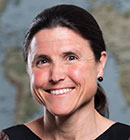Global health mentorship today: Carey Farquhar, MD, MPH
July/August 2024 | Volume 23 Number 4
 Photo courtesy of Carey Farquhar
Carey Farquhar, MD, MPH
Photo courtesy of Carey Farquhar
Carey Farquhar, MD, MPH
Dr. Carey Farquhar is a professor of medicine and epidemiology and acting chair of the Department of Global Health at the University of Washington.
While still in high school in France, I was selected to go to a program at Brown University that was a combination of undergrad and medical school.
To take care of a whole person, I need to be a whole person, I thought, so I studied international relations, I studied literature, I looked at culture and politics. I went to Africa twice when I was in college and that was quite formative. I helped build a school in a remote village in Côte d’Ivoire which made me realize that, as an individual doctor, you can only do so much. I decided that research would have greater impact and so I spent a year doing an HIV lab-based project at Harvard, and eventually went from there to molecular epidemiology, clinical research and global health.
When I did my fellowship in infectious diseases at the University of Washington, I had my first great research mentor, Dr. Grace John-Stewart. The project we worked on was a vertical HIV transmission project in Kenya. I had not taken care of pregnant women or neonates during my residency—I was an internist—and yet found myself collecting cord blood and doing exams on babies a few hours old. Grace was critical as a mentor and shaped the way I currently do my research. She insisted on rigor and, more importantly, inspired a love of science, of asking the questions that matter, and of figuring out how to ask the questions that matter. She also had the expertise to be able to say, That's not a good idea, or, No, don't do it this way, do it that way, or I'm going to give revisions and help you get this published. In Kenya, we work with communities that we're not necessarily a part of, so that means listening to local colleagues. Grace was living in Kenya, and she built friendships and bonds with her Kenyan colleagues and encouraged me to always do the same.
I've also been fortunate to have incredible career mentors. I could say to them, I've been offered this dean’s office position, should I take it? I tell my mentees: Get a whole bunch of mentors, because each will have a different perspective or meet different needs.
A mentor needs to believe in their mentees and care enough to prioritize their development and provide the time needed. In addition, competence and commitment must be there, as well as the ability to communicate in a way that is encouraging. Mentors sometimes need to have hard conversations, such as,
That didn't work out for you. Why? What needs to change? That’s part of mentorship, too.
Mentorship isn't just about meeting the person and becoming their mentee—it’s established over time and it's mutual. It’s important to feel that “click” in those first few months. A mentor needs to know where you've come from, know you as a person to provide more meaningful advice.
Right now, I'm mentoring a high school student, some undergrad and grad students, and, as Acting Chair [of Global Health], I had thirty-eight 30-minute meetings with faculty this year. It's increasingly hard for faculty to be successful. Someone who’s about my age was just telling me that 40% of NIH grants had been funded when he started, and now it’s just 8%. Encouragement is needed now, more than ever.
I love cross-cultural interactions yet building trusting relationships can be challenging. In sub-Saharan Africa, mentees often bring a formality to the relationship that can make it difficult for a mentor to know enough about the person to be effective. I've learned to ask more questions. Up front, I may need to say, I'm on your side and everything I do is to support you.
Mentoring is the most enjoyable part of my job. Mentoring others is a way that those of us who have worked hard and been fortunate can amplify our impact and bring along the next generation. By mentoring we can help carry the torch.
More Information
Updated August 14, 2024
To view Adobe PDF files,
download current, free accessible plug-ins from Adobe's website.
Related World Regions / Countries
Related Global Health Research Topics